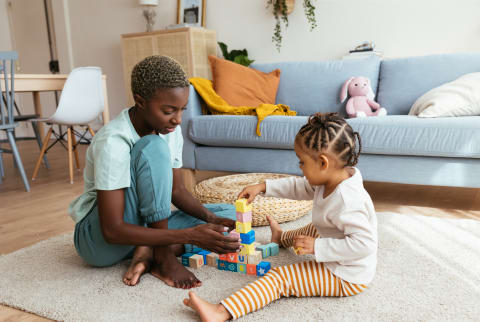“Paddle, paddle, paddle” the instructor yelled … “stand up!”
Catching my breath, one wobbly right leg somehow got underneath me. Then, I attempted to get the left to do the same.
Wobble, boom, splash. Down I go. Nope, not standing up on this wave!
Recently, for my birthday, I took a surf lesson with my wife. While this was mostly for fun, it was also to do something I’ve wanted to do my entire life. You see, even growing up in a surf town, I was intimidated to try surfing. So, fast forward 40 years later, and I did.
It taught me a lot more than I expected.
On the day of the lesson, the waves looked bigger, the board seemed heavier, and the rental wetsuit felt like I was wearing an elephant. None of that was true, but my mind didn’t care, it was convinced of these “facts”. With my heart pounding, my brain played a movie of the board knocking me out and me being pulled from the water unconscious by lifeguards.
Yes, this is melodramatic and silly movie, I know. However, when that happens in our brains, even if it’s silly, our body reacts pumping cortisol and adrenaline like we are fighting for our life. So, even after paddling over a few waves and being okay, my brain kept trying to play the disaster movie.
While I see this a lot with the kids and families I serve, this experience was a great reminder for me and my clients. When parents are learning new techniques to serve their families, all sorts of movies can play. Especially for parents who are currently churning with all sorts of tough issues with their kiddos.
As the lesson went on, I realized there was a lot to share here that might help my fellow parents. Here are six quick learnings from that surf lesson:
- The first few times will be a “failure”. You’re likely going to “wipe out”. The good news is that it won’t be as bad as you imagine and it’s possible you may even be able to laugh at yourself. It’s worth it to keep going, even if all you realize is progress (not instant mastery). You may be skeptical and doubting – that’s okay (if you keep going).
- A great guide makes a huge difference. Pick someone who can be with you both to teach you techniques, and help you through those first few rough starts, makes a big difference. Sure, you can do attempt to do it yourself (and some prefer that). However, a great guide makes a huge difference on getting outcomes faster.
- You won’t be a master at this at first, and it will feel awkward. For me, the “elephant suit” and my lack of flexibility made it a little harder for me than I expected. I could, of course, have given up and said, “this is not for me”. In fact, some of my clients do this and stick to what they know, even though it’s not helping them (or their families). They’d rather stay in the churning surf than truly attempt something new and proven. Our minds do this as a survival instinct. New and different are “bad” and you’ll find that all sorts of false reasons to not attempt something new will flood your brain. Want to stop that? Thank these thoughts for their service and appreciate that they are concerned about your survival. Then, keep going.
- You’ll be tired. You are doing new things. It’s unknown territory. It takes lots of energy at first. Over time, it’s not as tiring, and the effort is worth it. But, at first, make sure to take time to recharge so you have the strength for the next few times. Know that a result is coming, even if it doesn’t seem as immediate as you would like.
- Most people want you to do well. While it can be embarrassing falling when trying a new sport, not a single person laughed at me. In fact, quite the opposite. The guide, of course, was encouraging. More impressive to me, I found total strangers were encouraging me and giving ideas. My fear of getting in people’s way was totally unfounded, as I noticed many regulars giving space for this neophyte to attempt to stand. The same goes for parenting. You’ll likely find allies and supporters as you demonstrate you are working to improve yourself. They can’t see you until this happens. Yes, that might mean a “wipe out”.
So, how does this more directly translate to parenting? Here are six quick tips to help make that connection:
- When our kids have behavior issues, it can seem like a giant wave coming at us (or crashing on us) – that we don’t know how to handle. It can bring up fear, anger and upset. None of those emotions help very much, and they are natural responses.
- With a guide, we can learn new ways to get through and support our kids. While it might not exactly be “surfing” these issues, it will certainly not be the current experience of having these issues crash on us and create continued churning.
- These approaches may feel awkward at first, and even be embarrassing. We’ll probably wipe out some. There’s some unknown territory here and it can push on our family of origin’s belief systems. Make sure to be going for the result and not needing to be “right” about something.
- With consistent effort, both in learning and applying techniques, there is great improvement to be had. There can even be fun. A positive belief will carry you through.
- You will find support in many unexpected places as you go through this. Watch for new friends and ideas to start to show up.
- It does get (a lot) better – and it will take a different approach than you may know now. You don’t need to be in fear – nor do you need to stay in the crashing waves.
This has a very real world parallel for our family. Years ago, when my son was screaming and inconsolable, it was like the surf pummeling me (and him), all the time. What was staggering was the many things we tried from so many “experts” didn’t make it much better. Sure, maybe we had a flotation device occasionally, but we were still being pummeled.
One day, I did find a guide and applied what they taught me. It was incredibly awkward, like that elephant suit, at first. I was super skeptical. “This won’t work” was what my brain was telling me.
Except, my brain was wrong – it did work.
Yes, I wiped out a ton at first, and it took time to learn and apply these new approaches. And yes, I often wipe out some today.
Today, the waves of behavior issues don’t pummel us anywhere near as much anymore. And, when they do, we have a plan to help deal with that – without blow-ups.
It’s exciting now to be that guide for other parents, and help them through the waves.
If you know anyone who could use help – who may be struggling with really challenging parent situations – please feel free to reach out.
The waves don’t need to pummel them anymore.







